#Canadian Sikh
Explore tagged Tumblr posts
Text
Canadian Sikh group urges followers to protest outside Indian embassies - SUCH TV
A Canadian Sikh group has called on its members to protest outside the Indian diplomatic missions of main Canadian cities on Monday, a week after Prime Minister Justin Trudeau raised the prospect of New Delhi’s involvement in the murder of a Sikh separatist leader in British Columbia. Trudeau said last week Canada was pursuing “credible allegations” that Indian government agents may be linked to…

View On WordPress
#British Columbia#Canadian cities#Canadian Sikh#Indian diplomatic missions#Justin Trudeau#New Delhi#Protest#Sikh
2 notes
·
View notes
Text
Canadian citizen Hardeep Singh Nijjar was brazenly shot dead outside a Sikh temple in Surrey, B.C. on June 18. Nijjar, a supporter of a Sikh homeland in the form of an independent Khalistani state, had been branded by the Indian government as a "terrorist" and accused of leading a militant separatist group — something his supporters have denied. "Canadian security agencies have been actively pursuing credible allegations of a potential link between agents of the Government of India and the killing of a Canadian citizen, Hardeep Singh Nijjar," Trudeau said Monday in a speech to the House of Commons. "Any involvement of a foreign government in the killing of a Canadian citizen on Canadian soil is an unacceptable violation of our sovereignty."
Tagging @allthecanadianpolitics
139 notes
·
View notes
Text
Location: Brampton, Canada
Date: November 5
Hindu nationalists called for the Indian Army to invade and attack Sikh temples in Canada. They gathered in large numbers, attacked passing cars, and raised chants of “Jai Shree Ram.” The protest was organised against the alleged attack by Khalistan supporters the previous day.
#Brampton#canada#canadian#video#videos#class war#november 5th#nov 5th#hindutva#india#sikhcommunity#sikh#Khalistan#ausgov#politas#auspol#tasgov#taspol#australia#fuck neoliberals#neoliberal capitalism#anthony albanese#albanese government#oppression#free all oppressed peoples#oppressor#pedagogy of the oppressed#oppressive#repression#anti capitalism
2 notes
·
View notes
Text
To put this in context, Sikh extremist bombed an Air Canada 182 passenger jet bound for India. https://www.thecanadianencyclopedia.ca/en/article/air-india-flight-182-bombing
During Covid, Sikh's raised money here in Canada to send over to India for their farmer's strike against Modi during the harshest lockdowns. Indian Police officers died during the farmers protests over in India, but Trudeau did nothing to stop the fundraisers here or the money going to India, but he did lock up the peaceful Trucker's protest participants in Ottawa.
For all his tough talk to Russia, Canada has starved it's military into the ground, if he's talking tough on the world stage, he doesn't have a leg to stand on.
Sikhs regularly fly banners on the 401 to raise awareness for their homeland, as they want to secede from India. If they're that involved in Indian politics, can anyone seriously think these people are invested emotionally to be Canadians first or assimilate? So Trudeau has blown his own credibility and Canada's too with India. Probably time for him to go on the magical, pompous un-reality tour with Prince Harry, as neither of them seem to be listening to others or living in reality.
15 notes
·
View notes
Text

Late Bloomer (prod. Jasmeet Raina).
Crave's Sikh-Canadian family sitcom explores the intergenerational complications of contemporary internet culture colliding with traditional South Asian values. Created by and starring the former "Jus Reign" YouTuber, who rocketed to online stardom before going dark, his series balances issues of pleasing your immigrant parents and chasing your dreams while still living at home well into your thirties with trying to be true to both yourself and your heritage. It reveals so much about juggling multiple cultural identities while trying to make it in a social media influencer ecosystem.
#late bloomer#jasmeet singh#streaming#reviews#tv review#tv#television#tv show#tv series#features#jus reign#toronto#south asian#sikh#series#show#canadian#youtuber
5 notes
·
View notes
Text
'No consequences': Canadian Sikhs allege widespread threats and espionage by India | globalnews.ca
Documents released by the foreign interference inquiry on Thursday describe widespread threats and harassment of Canadian Sikhs by the Indian government, largely coordinated by diplomatic missions. Witnesses told the Hogue Commission behind closed doors that India had threatened their families, spied on temples and meddled in Canada’s elections, according to newly unsealed documents. India…
0 notes
Video
youtube
02-12-2024 - The historic battle for Khalistan - Trump: India align with...Angus Scott & James Cousineau's European & Canadian perspective on the big stories making the news relevant to the Sikh community. Today we cover: 00:00 Introduction 01:19 History of Sikh struggle for sovereignty 19:53 How concept of sovereignty exists 30:44 How Modi's Govt is holding India back by favouring billionaire mates 41:16 Trump applies pressure on India to align with West - or else 44:50 UK Sikh organisations oppose 'right to die' legal debate 48:31 Punjab's Sikhs to wrestle back control of its politics & organisations 54:15 Your Comments#perspectives #India #worldnews #internationalnews #news #breakingnews #globalnews #headlinestoday #newsheadlines #uknews #satlujtv #satlujnetwork #satlujnews #punjab #punjabnews #punjabimedia #sikhnews #sikhdiaspora #sikhsinusa #akalidal #bjp #indiannationalcongress #sarbatkhalsa #akaltakhat #canada #sikhsincanada #humanrights #amnestyinternational #humanrights #politics #indianpolitics #worldpolitics #sikhstruggle #khalistan #khalistanreferendum
#youtube#Angus Scott & James Cousineau's European & Canadian perspective on the big stories making the news relevant to the Sikh community. Today we
0 notes
Text
Happy Diwali
Happy Diwali and Bandi Chor Divas ‘Tuhanu Diwali diyan boht both vadhaiyan’ Keval Tank, CC BY-SA 4.0 via Wikimedia Commons Diwali is celebrated by millions of people in India, Canada and around the world. Hundreds of millions of Hindus celebrate “the Festival of Lights.” Millions of Sikhs, and eople of other faiths, ialso celebrate Diwali. For Sikhs the festival has added significance as it…

View On WordPress
#Bandi Chhor Divas#Diwali#Hindus#India#Indo-Canadians#Jains#Sikhs#South Asian Canadians#South Asian Diaspora
0 notes
Text
Canada accuses Indian minister Amit Shah of plotting attack on Sikh separatists
The Canadian government claimed that Indian Home Minister Amit Shah was behind plots to attack Sikh separatists in the North American country, Reuters reported.
However, New Delhi dismissed Canada’s earlier allegations as baseless, denying any involvement. According to The Washington Post, Canadian officials claimed that Shah allegedly promoted a campaign of violence and intimidation against Sikh separatists in Canada, Canadian Deputy Foreign Affairs Minister David Morrison disclosed.
The journalist called me and asked if it [Shah] was that person. I confirmed it was that person.
India labelled Sikh separatists as “terrorists” and a threat to its security. Sikh separatists are demanding the secession of an independent homeland known as Khalistan from India. Insurgency in India in the 1980s and 1990s killed tens of thousands of people.
The 1984 riots erupted when Sikh bodyguards killed then-Prime Minister Indira Gandhi after she had ordered security forces to storm the holiest Sikh temple to dislodge Sikh separatists.
Canada expelled Indian diplomats in mid-October, linking them to the assassination of Sikh separatist leader Hardeep Singh Nijjar in 2023 in Canada. In response, India ordered the expulsion of Canadian diplomats.
The US also indicted former Indian intelligence officer Vikash Yadav for allegedly masterminding an uncovered plot to assassinate Sikh separatist leader Gurpatwant Singh Pannun, a dual US-Canadian citizen and Indian critic in New York.
The charges tested Washington and Ottawa’s relationship with New Delhi, which is often seen as a rival to Beijing.
Read more HERE

#world news#news#world politics#canada#canada news#canada politics#canadian politics#canadian news#india#india news#india politics#india canada#sikhism#sikhcommunity#sikh separatist#amit shah
0 notes
Text
Canadian police said they arrested three suspects Friday in the slaying of a Sikh separatist leader last June that become the center of a diplomatic spat with India, and are investigating possible ties between the detainees and the Indian government. Three Indian nationals in their 20s identified as Kamalpreet Singh, Karan Brar and Karampreet Singh were arrested in Edmonton, Alberta on Friday morning in the slaying of 45-year-old Hardeep Singh Nijjar by masked gunmen outside Vancouver, police said. Canadian Prime Minister Justin Trudeau sparked a diplomatic feud with India in September when he said that there were “credible allegations” of Indian involvement in the slaying of Nijjar. India had accused Nijjar of links to terrorism, but angrily denied involvement in the slaying. In response to the allegatio ns, India told Canada last year to remove 41 of its 62 diplomats in the country. Tensions remain but have somewhat eased since.
Continue Reading.
Tagging: @newsfromstolenland
27 notes
·
View notes
Text

3x10 Perfect Strangers | Multiculturalism
This episode is (like the rest of the show, but still) particularly and obviously preoccupied with the differences between Canada and America—especially since this is the episode where they fly to Toronto.
As Fraser says upon landing at Pearson about the dual French/English announcements over the PA:


And this is true!
The American “melting pot” philosophy of immigration is an assimilationist one: as different cultural groups join the society, they “melt together” into one common culture. Typically, this means erasing the unique parts of your own culture to become more acceptably American (and you know exactly what that means as well as I do.)
Canada’s multiculturalist approach is instead an example of a “cultural mosaic” model, in which we believe that disparate cultures can co-exist side-by-side and, in maintaining their own individual identity, enrich each other in the process.
The Multiculturalism Act, meant to make preserving and enhancing cultural diversity part of official government policy, was signed in 1971 (the OG Trudeau government was big on this). As of 2016, there were over 250 different ethnic groups in Canada.
Which brings us back to our top GIF!
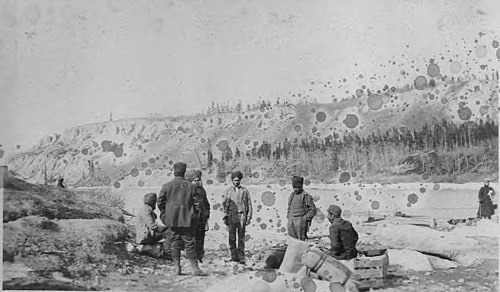
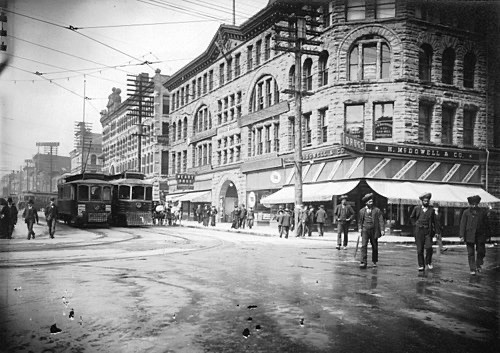
Punjabi Sikhs in Whitehorse and Vancouver, 1906 and 1908
Sikhs are the fourth-largest religion in Canada, and have a large population out West. Canada actually has the largest national Sikh proportion in the world (at 2.1%), and the second-largest Sikh population in the world (after India).
So naturally, some of them would want to join the RCMP.
I’m going to let this article from the CBC tell this story far better than I could:
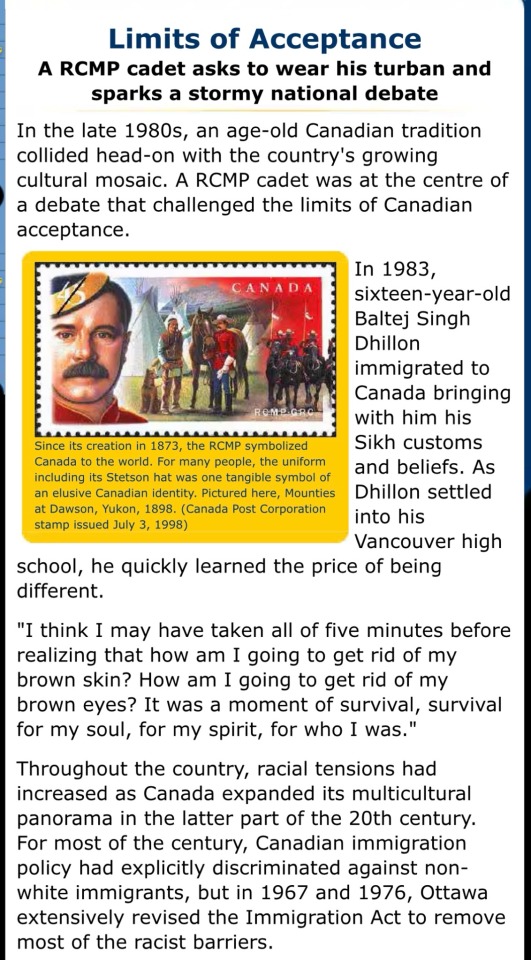
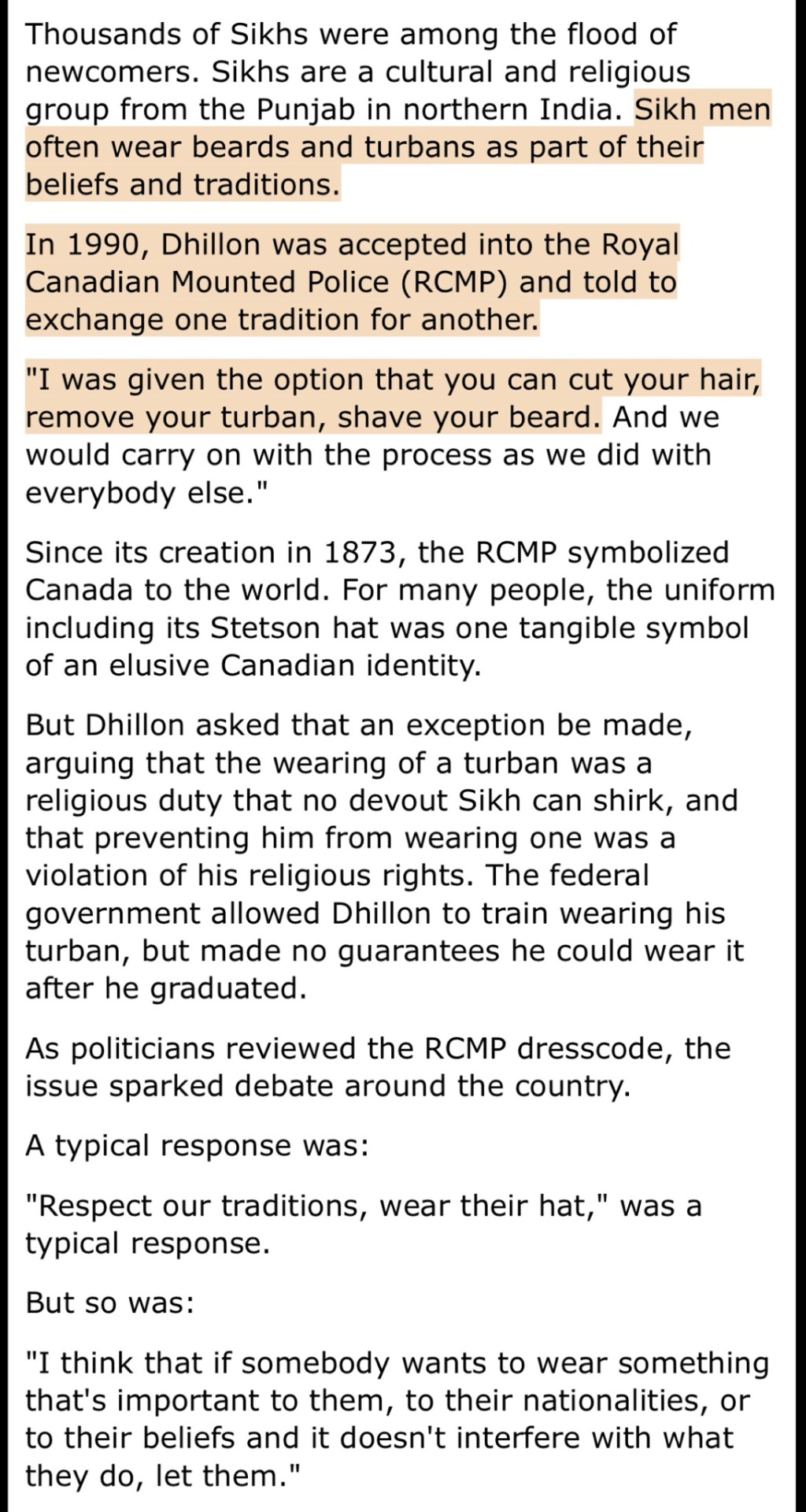

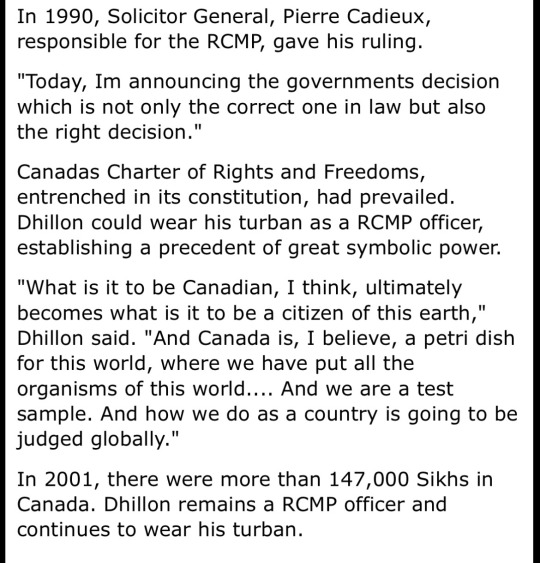
And so that’s why, for a brief moment, due South shows us a Sikh officer in a turban outside RCMP HQ.
(Which is actually the Canadian Blood Services HQ, in the building of what was once the Victoria Hospital for Sick Children, built in 1892!)
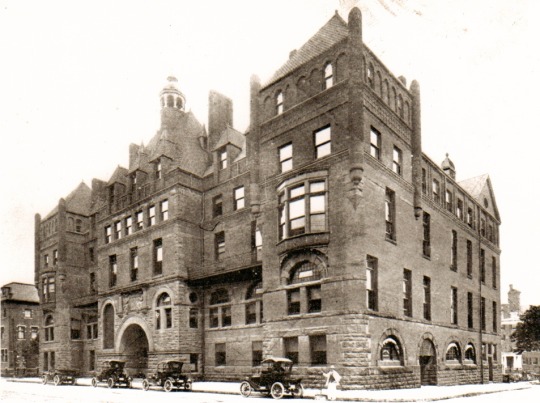
Quiet Canadiana in due South [more]
74 notes
·
View notes
Text
Canada and India each expelled six diplomats Monday in tit-for-tat moves as part of an escalating dispute over the June 2023 assassination of a Sikh activist in Canada. Foreign Minister Mélanie Joly said that Canada was expelling six Indian diplomats, including the high commissioner, after police uncovered evidence of a targeted campaign against Canadian citizens by agents of the Indian government. Shortly afterward, the Indian foreign ministry said that it was expelling six Canadian diplomats, including the acting high commissioner and the deputy high commissioner. It said in a statement that the diplomats were told to leave India by the end of Saturday. The ministry had said earlier Monday that India was withdrawing its diplomats, after rejecting Canada’s diplomatic communication on Sunday that said the Indian ambassador was a “person of interest” in the assassination. A senior Canadian official said that Canada expelled the Indian diplomats first before they withdrew. Both officials spoke on condition of anonymity because they weren’t authorized to speak publicly on the matter.
91 notes
·
View notes
Text


100 Portraits Challenges - Part 8 and 9
Not real ambitions for character associations here. Just looking for interesting faces and a broader diversity of skin tones.
Part eight
49-50) American actress Julia Jones
51) American actor Ritesh Rajan
52 - 53) Sikh American designer and actor Waris Ahluwalia
54 - 55) Indian actor, martial artist and stuntman Vidyut Jammwal
Part nine
56) Harvey Guillén as Guillermo De la Cruz
57-58) Canadian/American/Gambian YouTuber Khadijah Mbowe
59) One of the portraits of the Humanae Series by photographer Angélica Dass
60) German rock musician Gil Ofarim
61) Ivorian model Aminata Sanogo
The Humane series by Angelica Dass is pretty neat. It shows both the broad variety and similarities across humans from all kinds of ethnicities.
------------------------------------------------------------------------------ Part 1 – Start of the project Part 2 – Kaladin Part 3 & 4 – Adolin and Renarin Part 5 – Dalinar Part 6 & 7 – Shallan and Jasnah Part 10 – a little bit for The Lopen Part 11 & 12 - Wit and Navani Part 13 - ofmd und Dev Patel :) Part 14 more ofmd and Patel
153 notes
·
View notes
Note
What’s the context of CD being racist towards men wearing turbans?
Does anyone have the clip of Lily defending the Trudeau blackface and saying "out of our current Parliament leadership, Trudeau's like, the least racist." On Monday March 3rd, 2025? I forgot to pull it from the stream.
Anyway, the context is, Lily has a hate boner for the NDP.
Because she's actually very [-> CANADIAN<-] conservative (as in, she's a neoliberal who aligns with the OLD Canadian Conservative Party's Tory.)
In Canada, a very very VERY common form of islamophobia/general brown people that give people Islamic vibes, whether they are Muslim or not, is saying or implying they're all fundamentally "Anti-Western," typically in the form of assuming they're bigots.
This is speculative on my part, I have no hard evidence.
But if you will all trust me for five seconds that I know my country, I have WHITE Muslim family members and BROWN non-muslim family members-- I can assure you it IS a race thing almost all the time mixed in with a xenophobia thing only SOME of the times.
It's very likely part of the reason she doesn't like the NDP is because their party leader is an Indian Sikh. She thinks he's a bigot because brown man with turban scary.
If you want further explanation scroll through my blog, I've been yapping up a storm about this for weeks.
I should probably make a master post so I don't have to keep repeating myself.
#lily orchard#lily orchard critical#anti lily orchard#liquid orcard#lily peet#lily orchard stuff#lorch posting#youtube#eldritch lily#cd call#cd call critical
11 notes
·
View notes
Note
I think back to if I had been alive back then, I might have agreed with the creation of Isreal (with the Holocaust being so fresh in everybody's minds it makes sense that Jews have a reason to be concerned for their preservation) but learning of the Nakba and the continued occupation and treatment of the Palestinians (much in part thanks to you) I cannot support them. The Holocaust does not give Zionists a "get out of Genocide Free" Card.
Shifting gears a bit, I am Canadian, and our government has been put in an unfortunate position with India over the assassination of a man who was an advocate for the Khalistan Movement. Now while I intend to do my own research into it, I was curious your opinion (if any) on the creation of a separatist Sikh state?
I am against any ethnostate or/and states in general. Or in ML terms, I'm for the abolishment of states.
Nevertheless, being free from persecution does not require a homeland, and a Jewish ethnostate is contradictory, because JEwish people aren't monolith. Historically, Jewish people all over the world have come to create their own cultural, ethnical and religious identities that are vastly different from each other, the question then becomes a complicated one, how does one unify under one single homogenized state? If we look at Israel, then we know that they have systematically pulled efforts into erasing various Judeo-inspired languages, such as Yiddish or Judeo-Arabic, and it wasn't long ago when they forcefully sterilized Ethiopian Jews, who are still experiencing racism in Israel. I can't say I know much about how class differences work within the Jewish community, so I'll abstain from that. Nevertheless. It's obvious that for a state to become unified, there must be one codex of identity that all of them has to be identified under, while everything else is undesirable. This is the path to fascism, and you've already seen MPs in the Knesset expressing the desire for ethnic cleansing.
As for the Sikh state, I am against theocracies, ethnoreligious states or any state that adopts a de facto profanum/sanctum consitution.
148 notes
·
View notes
Video
youtube
PROUDLY SIKH, PROUDLY CANADIAN ART WORKS1000's of Items #Sikh #Sikhs #Si... PROUDLY SIKH, PROUDLY CANADIAN ART WORKS 1000's of Items#Sikh #Sikhs #Sikhi #Proudsikhs #ProudlySikh #ProudlyCanadian #Sikharts #Sikhart #Artwork #Gurdwara #GuruNanak #WorldSikhFederation #JamesCousineau #Arts #HomeDecor #decor #framedprints #Home #framedprints #Apparel #Clothing #shirts #AdobePremierePro #Gifts #GiftIdeas
#youtube#PROUDLY SIKH PROUDLY CANADIAN ART WORKS 1000's of Items Sikh Sikhs Sikhi Proudsikhs ProudlySikh ProudlyCanadian Sikharts Sikhart Artwork Gu
0 notes